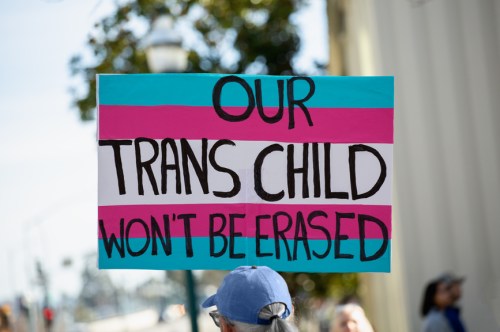Texas Is Trying To Classify Gender-Affirming Care as Child Abuse—Here’s What That Means for Trans Youth
Texas Gov. Greg Abbott sent a letter to DFPS directing them to interpret gender-affirming care for trans children as child abuse.

On Tuesday, Texas Governor Greg Abbott sent a letter to the Texas Department of Family Protective Services (DFPS), directing the organization to interpret gender-affirming care for trans children as child abuse and investigate cases where they suspect such care. The letter comes after Texas Attorney General Ken Paxton penned an opinion—which is an interpretation of existing law—that labels gender-affirming interventions like puberty blockers, hormone therapy, and surgery as child abuse.
Experts in This Article
trans activist, civil rights attorney, and clinical instructor at Harvard Law School’s Cyberlaw Clinic.
Founder and President of the Transformations Project
Chief Legal Officer, Texas Advocacy Project
Press Secretary of National Womens Law Center
vice president of policy and strategic engagement at Lawyers for Good Government
Abbotts’ directive also calls on professionals and other adults to report instances where they suspect trans children have received gender-affirming care. Under existing mandatory reporting law, every adult in Texas who suspects physical, verbal, or sexual abuse must report it to DFPS, says Bronwyn Blake, chief legal officer, Texas Advocacy Project. Failure to report can result in imprisonment and a fine, according to Section 261.101 of the Texas Family Code.
This news is devastating and confusing; however, Blake says it is unclear whether DFPS will actually investigate these cases. An opinion is not a law, says Alejandra Caraballo, trans activist and attorney, formerly with Transgender Legal Defense Fund (TLDEF)l. So this letter is a non-binding interpretation of the existing legislature. Still, if this news has you worried, you’re not alone. The directive stokes fear among trans youth and their families. What does someone with a trans child do if they worry they can’t trust their neighbors, teachers, and healthcare providers? The consequences of this are far beyond legal fine print and embolden those who harbor existing bias against trans people. Below, we asked experts to explain what gender-affirming care is, what’s at stake for trans children in Texas, and whether or not this directive will be enforced.
What is gender-affirming care
Gender-affirming care is an evidence-based care framework that “affirms diversity in gender identity and assists individuals in defining, exploring, and actualizing their gender identity, allowing for exploration without judgments or assumptions,” according to Columbia University Department of Psychiatry. It includes medical interventions like puberty blockers, hormone replacement therapy, and gender-affirming surgeries. The Academy of American Pediatrics states that gender-affirming is a proven, evidence-based treatment for trans-youth-related mental health disorders and gender dysphoria, according to Gillian Branstetter, press secretary for the National Womens Law Center.
Though not legally binding, classifying life-saving medical interventions as child abuse can make it harder for providers to administer gender-affirming care to children and minors, Caraballo says. Additionally, Caraballo says that picking up prescriptions, applying for insurance coverage, confiding in teachers, therapists, neighbors, social workers, camp counselors, and anyone who works with children becomes more difficult (and potentially dangerous). She adds that this can lead caring parents to delay treatment for fear of ramifications.
It’s important to note that gender-affirming care has never been considered child abuse in any court—it is potentially life-saving treatment, Branstetter says. A 2020 Trevor Project survey found 54 percent of trans youth have contemplated suicide in the previous year, and 29 percent reported having attempted suicide. Alternatively, a 2016 study published in the journal Pediatrics showed trans youth who received gender-affirming care had similar levels of mental health disorders as their cisgender peers. It can contribute to overall wellbeing.
Will this directive be enforced
Although this opinion is not a bill, it comes on the heels of anti-trans legislation proposed by Governor Abbott that failed to pass in 2021, according to Alex Petrovnia, founder and president of Trans Formations Project, an organization following anti-trans legislation and providing volunteer opportunities for organizing against these bills.
“Governor Abbott and Attorney General Paxton do not have the authority to rewrite Texas law. They’re both lawyers; they know their opinion goes way beyond any reasonable analysis of existing Texas law,” says Mika Fernandez, a civil rights attorney and Vice President at Lawyers for Good Government. “They are purposefully misstating the law and causing innocent law-abiding Texan children and their parents to live in fear.”
On Thursday, February 24, five district attorneys in the largest Texas counties released a joint statement that they would not enforce the directive. The concern, however, is in smaller rural communities where there might be only one social worker, Caraballo says. If that social worker has anti-trans beliefs, they could use the directive to report and investigate trans students. This becomes even more challenging for people of color, lower-income individuals, and immigrant communities when you factor in racism, language barriers, and socioeconomic challenges, she says, adding that it will make families less likely to seek care.
Additionally, the directive speaks to the existing and growing transphobia in the U. S., says Blake. Anti-trans legislation has arisen across the country in predominantly red states in the last two years, Petrovnia says. So, even though Texas adults won’t be persecuted for supporting and acquiring care for trans children, the attempt can intimidate, harm, and isolate trans children, as well as those trying to support them, says Branstetter. Since 2020 the Trevor Project reports that calls to their crisis lines have increased 200 percent. Legality aside, there are real consequences for trans youth and the people that care about them.
Oh hi! You look like someone who loves free workouts, discounts for cutting-edge wellness brands, and exclusive Well+Good content. Sign up for Well+, our online community of wellness insiders, and unlock your rewards instantly.
Sign Up for Our Daily Newsletter
Get all the latest in wellness, trends, food, fitness, beauty, and more delivered right to your inbox.
Got it, you've been added to our email list.










